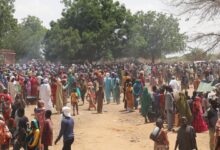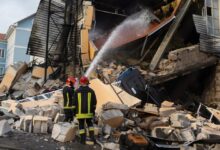WHO highlights mental health crisis facing Israel’s frontline workers a year after 7 October attack
 As the world remembers the Hamas-led terror attacks on Israel exactly one year ago, the World Health Organization (WHO) is highlighting how the tragedy triggered a mental health crisis among frontline workers.
As the world remembers the Hamas-led terror attacks on Israel exactly one year ago, the World Health Organization (WHO) is highlighting how the tragedy triggered a mental health crisis among frontline workers.
Responders including ambulance drivers, health workers and forensic teams who identified many of the dead, all witnessed “carnage and horror” which resulted in lasting trauma.
Tweet URL
An organization named Mashiv Ha’Ruach, which means “Bringing back the spirit”, provided mental health and psychosocial support through workshop retreats supported by WHO/Europe. These sessions allowed workers to discuss their trauma and develop coping mechanisms.
Founder of the organization, Eyal Kravitz, said he established the group days after the attacks as he wondered, who will help the helpers?
The workshops
Many of the recovery volunteers who offered their assistance following the attack developed insomnia, post-traumatic stress disorder (PTSD), and high levels of depression and anxiety which caused a “ripple effect that impacted on their families and at their workplace.”
Mashiv Ha’Ruach’s workshops were part of a retreat and took place in the desert, away from the “noise and distraction of daily life” and encouraged participants to share what they had experienced.
“At first, no one thought they needed to talk about their experiences,” said Daniel Chermon, co-founder of Mashiv Ha’Ruach.
“So, it was initially hard for us to convince them to come, but once they came, people started hearing from their colleagues about the value of the retreats.”
Oz Tal, a first responder on 7 October, said the workshop gave him a “language to describe and express his feelings.”
“First of all, most of the volunteers, when I tell them to come to the retreat, they tell me that they’re okay. They don’t need anything. They don’t want to come,” Mr. Tal said.
He continued, “But during the retreat, after we start talking about our feelings, the first one starts talking and starts sharing their problems, then the whole group starts. You cannot imagine the spirit in the room in that moment.”
Working with the volunteers
Atzmon Meshulam developed the workshop programme and said the sessions help participants change the way they talk about what they experienced. She noted that many volunteers seemed calmer after the sessions.
“I received a message from the wife of a volunteer who attended the workshops. She wrote to me that she had got a new man back, that this was the first time that he had slept through the night since 7 October,” Ms. Meshulam recalled.
Hodaya Leshem, one of the workshop attendees who is a mother of four and married to a soldier said, “I had no support before I came to the meetings.”
“I had to hold everyone in the family and community together, but there was no one there to hold me,” she continued.
Mashiv Ha’Ruach has now extended its workshop to partners of impacted staff and volunteers “to build a wider network of resilience and support skills.”
Testimonies
The Soroka Medical Center, a hospital almost 25 miles from Gaza, catered to 680 patients – 120 of whom were critically wounded – within 16 hours following the 7 October attack.
WHO said many staff lost close relatives or lived in areas that were attacked.
Dr. Dan Schwarzfuchs, Director of the Emergency Department at Soroka Medical Center said workers would not have survived the job if they were not strong.
“I knew in my belly I had to find something that would help them stay resilient,” he said.
He said therapy provided through the workshops helped foster bonds between staff from the medical centre.
“Colleagues who before didn’t want to speak about their experiences are opening up because they hear experiences from others,” Dr. Schwarzfuchs said. “People I didn’t expect would ever attend are doing so now.”
The retreat also was beneficial for Ayelet Harris, Head of the Community Department of the Kibbutz Movement, who said the sessions provided a space for responders to express themselves for the first time.
“In the retreat, I felt that this was one of the first times I felt re-energized, as the focus was on me and my needs,” Ms. Harris said. “It was a safe place for me to express what I went through, and someone was there to listen to me…This was refreshing and renewing.”
Providing support
Since the beginning of 2024, Mashiv Ha’Ruach has helped nearly 1,000 people through their workshop retreats.
“We didn’t start Mashiv Ha’Ruach under good circumstances. But the fact is that people need it and they’re going to still need it for years to come,” co-founder Chermon said.
Founder Kravitz said their partnership with the health organization allowed for a wide reach of individuals.
“We are proud to be the only resilience initiative in Israel that has received WHO recognition, thanks to the recommendation of the Israeli Ministry of Health,” he said. “This partnership has been invaluable, and I want to express our deep appreciation for WHO.”
In addition to supporting Mashiv Ha’Ruach, WHO has also assisted the Israeli non-governmental organization Mosaica through an initiative that involves
religious leaders from both Jewish and Muslim communities, to connect individuals with useful mental healthcare resources, increasing uptake and lowering the stigma of seeking treatment.



